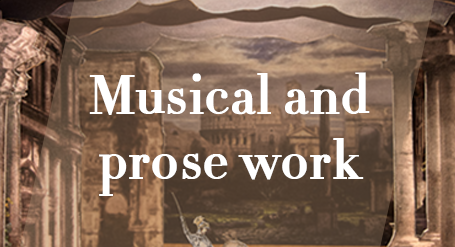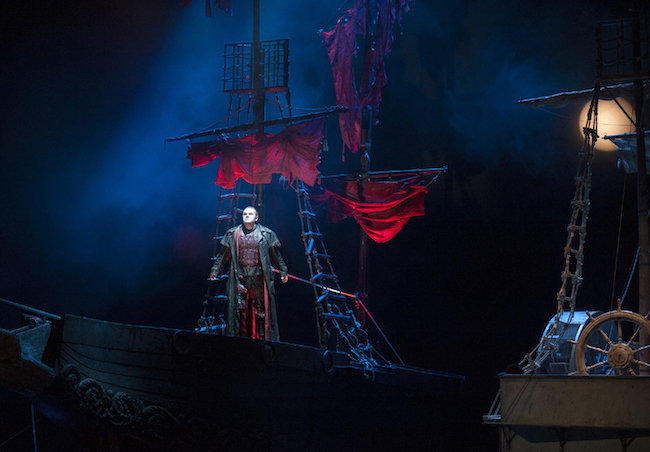
The musical work of Richard Wagner is composed of operas or “musical dramas” ranging from “Fairies” (Die Feen) to “Parsifal”. A detailed presentation of each of these major works is associated here with a set of thematic articles, placing them not only in the context of his personal life but also in his social, economic and cultural context. This section also includes all the musical works (excluding opera) and his literary work.
The Flying Dutchman, WWV63
Der Fliegende Holländer, WWV63
In short
Romantic opera in three acts
Text and music by Richard Wagner,
after Heinrich Heine’s novel
The Memoirs of Mister von Schnabelewopski
(Aus den Memoiren des Herrn von Schnabelewopski)
Premiere:
2nd january 1843, Royal Theatre of the Court of Saxony, Dresden (Semperoper), led by the composer
![]()
ACT ONE
Off the coast of Norway
As Daland’s crew makes his ship secure against a raging storm, he goes ashore and discovers that they are only seven miles from home. All retire for the night except the steersman, who sings about his sweetheart as he keeps watch. He dozes, unaware that the Flying Dutchman’s ship has suddenly appeared alongside. Seven years have passed since the Dutchman was last on land, and he is again free to search for a faithful woman who will save him from his fate. He has tried in vain to get himself killed by pirates or storms and longs for salvation or extinction.
Daland comes out of his cabin and rebukes the steersman for not keeping good watch. He interrogates the Dutchman, who, learning that Daland’s home is nearby, asks for hospitality, promising to pay well, and producing chests of jewels. When he learns that Daland has a daughter, he asks for her as his wife.
Although startled by the suddenness of this proposition, Daland is so impressed by the stranger’s wealth that he has no hesitation in accepting him as a prospective son-in-law, while the Dutchman hopes that Daland’s daughter will prove the agent of his salvation. The south wind blows up and the ships are able to proceed. The sailors work cheerfully as they think of the joys of home.
![]() ACT TWO
ACT TWO
A large room in Daland’s house
Senta sits apart from the other girls who are singing as they spin, and gazes dreamily at a portrait on the wall. Her nurse Mary tries to distract her, while the girls jeer, warning that her sweetheart, the hunter Erik, will be jealous.
Senta sings the ballad of the Flying Dutchman – telling how, battling against a storm, he once swore to sail round a cape if it took him all eternity. Satan took him at his word and he had been cursed to wander the seas forever unless he could find a woman who would be faithful to him till death.The girls echo Senta’s prayer that the wanderer will soon find rest and redemption. She hopes she will be the woman chosen to save him. Her prayer that an angel will soon bring him to her is overheard by Erik.
His announcement of the arrival of the ship sends the girls off to greet their sweethearts, but he detains Senta, who is eager to see her father, and begs her to agree to their marriage before her father sails again. When she evades the question, he blames her obsession with the portrait. He is reminded of a dream in which he saw Daland returning from a voyage accompanied by a strange man who resembled the figure in the portrait. In the dream Senta had embraced the stranger and both had vanished over the sea. The only effect his narrative has on Senta is to convince her that the Flying Dutchman has come for her.
The dejected Erik leaves and Daland arrives with the Dutchman, whom Senta recognises with a cry – virtually ignoring her father, who is disconcerted by her lack of welcome. He presents the stranger, stressing his homelessness and his wealth, first asking Senta to give him hospitality, but moving on quickly to offer her the newcomer as a bridegroom. Neither Senta nor the Dutchman speaks so much as a single word and Daland leaves them alone together. They gaze at one another, wrapped in their own thoughts, both feeling that this is the moment they have been waiting for. The Dutchman asks if she consents to her father’s choice, and she accepts him, promising to be faithful till death. When Daland returns, they pledge their faith before him.
![]() ACT THREE
ACT THREE
A rocky bay by Daland’s house
The Norwegian sailors are singing and dancing, but there is silence on the Dutchman’s ship, which is anchored nearby. The Norwegian girls bring food and drink, offering some to the strange ship, but there is no answer. The Norwegian sailors suggest in jest that this must be the Flying Dutchman’s ship, and they proceed to taunt the silent crew. The Dutchman’s ship suddenly becomes the centre of a storm and the ghostly sailors wake, deriding the Norwegians as they flee below decks in terror.
Senta appears, followed by Erik, who reproaches her with having broken faith with him, though she says she has never promised to marry him. Overhearing this, the Dutchman fears that Senta will be incapable of keeping faith with him and bids her farewell, but assures her that she will not have to suffer damnation as had other girls who had broken faith with him.
He calls his sailors to prepare for departure and when Senta tries to stop him, tells her who he is and what his fate is; but she answers that she knows this, and proceeds to predict that she will save him. Her friends restrain her as the Dutchman boards his ship, but she tears herself away and throws herself into the sea, declaring that she is faithful till death. The ship sinks and the ghostly figures of the Dutchman and Senta are seen rising, embracing and transfigured, from the wreck.
If you wish to share further information about this article, please feel free to contact us !
